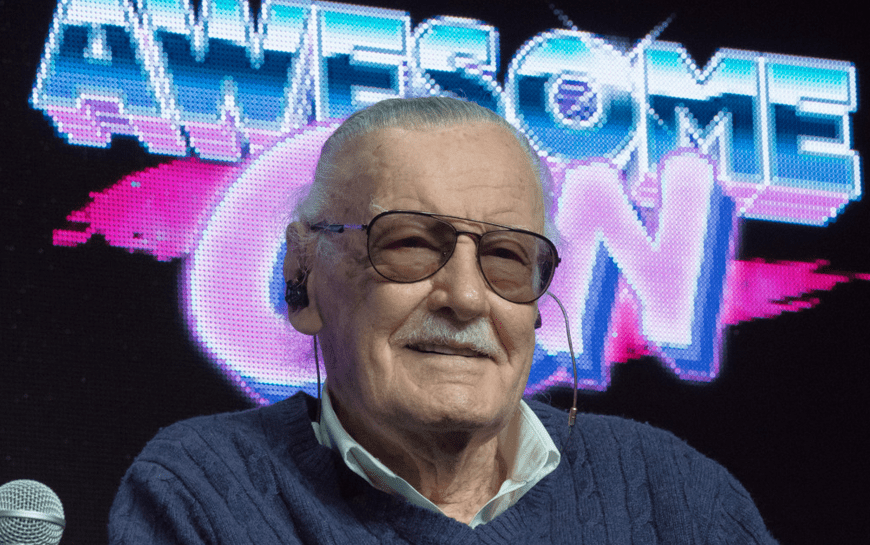Master of His Universe, Stan Lee —1922-2018
By • November 13, 2018 0 791

Stan Lee is dead.
Not so the Marvel Universe he created. That, in all of its ubiquitous forms, will be around just about forever, and not just on earth.
Somewhere here on earth, or probably in a deep space and sleep, an alien as yet unknown with superpowers as yet unknown will awake, troubled by a dream in which he was fired by a cantankerous boss from his job as an assistant to one of the assistants to one of the Guardians of the Galaxy. He or she has probably turned on a device or a holographic form of the complete editions of Marvel Comics and soon enough they will fill the falsely created air with their antics, alive like creatures in a dreams that buzzed and filled the minds of young earthlings.
He looks up, dazzled and pleased with the familiar forms and tropes—Thor and his hammer and his somewhat Shakespearean proclamations, the breathless Spiderman flinging his nets from New York buildings to maybe even Radio City Music Hall, Doctor Strange and his, well, strange cape, Iron Man still looking very much like Robert Downey Jr.’s career saver, the X Men and the Fantastic Four, Captain American hurling his shield, Black Panther encased permanently as a royal icon — and all the others, Loki, the Hulk, the Silver Surfer and so on.
Being restless, this traveler will first look at them in their initial form as characters and figures on a drawing board, speaking only in balloon talk, the sound of bullets, collisions, fist-in-the-face, zooming past Dr. Doom, provided by brazen words in bright colors and exclamation points, finessed into birth by Lee, as creator, part writer, part idea man and God with the help of and the likes of Jack Kirby.
Then, in the late 20th and early 21st centuries, it all changed—outdated became the comics and the graphic novels and the print by an early television series and by the movies, which have become a universe in and of themselves, a billion-dollar Hollywood studio business, and career extender for actors who become something else in steel helmets, people who can fly by themselves, who, like a Hulk, cast a shadow to darken Kentucky and Ohio and Manhattan (where Lee was born) together.
All this because of Lee, a skinny man all of his life, who had the look of a hustler and the imagination, boundless, unchecked of an ambitious child. He was like a loveable scalawag, a man who loved the spotlight and was not above taking all the credit when he could. Like Captain Picard—which has nothing to with Marvel—he could make it so, he could imagine a Silver Surfer, a Peter Parker become Spidey, a Thor tangling with Loki, X Men and (women) who were mutants who were once and always bullied, who could speak and move like teenagers.
The Marvel movies have taken over the box office, to be sure, but there are those beings among us—archaic, perhaps, like elders from another galaxy, who remember the printed marvels who were marvelous indeed, and included cowboys, some Indians, WWII soldiers like Sgt. Fury who became Agents of Shield. These elders—you know who you and we are—partook of the alternative styles of DC Comics and happened to like both.
Lee’s Marvel Comics had a certain raw, even sloppy straight forwardness that was appealing and realistic and resonant of daily life—teen angst and bully gloating—as well as Captain America’s straight up heroics and the Red Skull’s frightening menace. DC Comics was a little more stolid, heads up and a little distant, more Grimm than grim. Superman was indeed super and from another planet and flew, fist out, like someone who had been told all of his life to stand up straight, or, in his case, straighten up and fly right. Plus, if you could get a cache of Kryptonite, well, down to earth for Clark Kent.
The high-glory artwork of DC—you could just like to gaze at the panels as much as be frightened by the villains, had its appeal. Marvel on the other hand was kinetic—kaboom, indeed. The panels seemed to ripple in your hands, they were movies before they became movies and born to it.
Superman, Batman and Wonder Woman these rank high these days, especially the truly first Wonder Woman. Still, it’s Marvel which commands the world, the world of comics, the world heroic.
As our alien traveler, after ingesting the life, times and work of Stan Lee, returns and rests in his time and space traveling glass container. He sighs a sleepy blessing to his creator.
God bless Stan Lee: father of super heroes, master of his universe.

